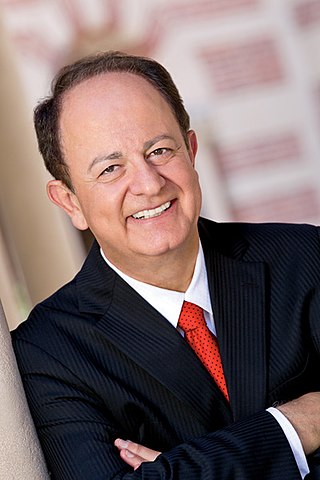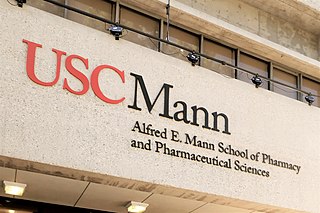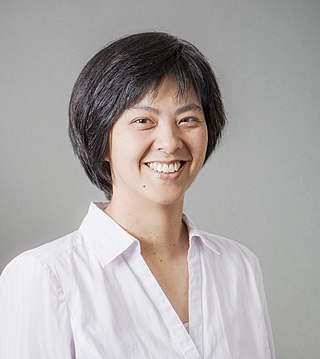Related Research Articles

The University of California, San Francisco (UCSF) is a public land-grant research university in San Francisco, California. It is part of the University of California system and is dedicated entirely to health science and life science. It conducts research and teaching in medical and biological sciences.

Virginia Commonwealth University (VCU) is a public research university in Richmond, Virginia. VCU was founded in 1838 as the medical department of Hampden–Sydney College, becoming the Medical College of Virginia in 1854. In 1968, the Virginia General Assembly merged MCV with the Richmond Professional Institute, founded in 1917, to create Virginia Commonwealth University. In 2022, more than 28,000 students pursued 217 degree and certificate programs through VCU's 11 schools and three colleges. The VCU Health System supports health care education, research, and patient care. It was the only school in the South to have graduated a class every year during the American Civil War.
The Stanford University School of Medicine is the medical school of Stanford University and is located in Stanford, California, United States. It traces its roots to the Medical Department of the University of the Pacific, founded in San Francisco in 1858. This medical institution, then called Cooper Medical College, was acquired by Stanford in 1908. The medical school moved to the Stanford campus near Palo Alto, California, in 1959.

Scripps Research is a nonprofit American medical research facility that focuses on research and education in the biomedical sciences. Headquartered in San Diego, California, the institute has over 170 laboratories employing 2,100 scientists, technicians, graduate students, and administrative and other staff.

Gary K. Michelson is an American orthopedic surgeon, medical inventor, and billionaire philanthropist.
The Keck School of Medicine of the University of Southern California teaches and trains physicians, biomedical scientists and other healthcare professionals, conducts medical research, and treats patients. Founded in 1885, it is the second oldest medical school in California after the UCSF School of Medicine.

The W. M. Keck Foundation is an American charitable foundation supporting scientific, engineering, and medical research in the United States. It was founded in 1954 by William Myron Keck, founder and president of Superior Oil Company. The Foundation's net assets exceeded $1.3 billion at the end of 2019.

Kathy Giusti is a business leader and a healthcare disrupter. She is a two-time cancer survivor having been diagnosed with multiple myeloma and breast cancer. Kathy Co-Founded the Multiple Myeloma Research Foundation where she was CEO and president for nearly two decades. She also co-chaired the Harvard Business School (HBS) Kraft Precision Medicine Accelerator, which she helped found, as a Senior Fellow at Harvard Business School.

Chrysostomos Loizos "Max" Nikias is a Cypriot-American academic, and served as the 11th University of Southern California president, a position he held from August 3, 2010, to August 7, 2018. He holds the Malcolm R. Currie Chair in Technology and the Humanities and is president emeritus of the university. He had been at USC since 1991, as a professor, director of national research centers, dean, provost, and president. He also served as chair of the College Football Playoff (CFP) Board of Managers (2015-2018) as chair of the board of the Keck Medical Center at USC (2009-2018), as member of the board of directors of the Alfred Mann Institute for Biomedical Engineering (2001-2018), and as a member of the board of trustees of the Chadwick School, an independent school in Palos Verdes Peninsula, Calif. (2001-2010). He is currently a tenured professor in electrical engineering with a secondary appointment in classics, and the director of the USC Institute for Technology Enabled Higher Education.

Kansas City University (KCU) is a private medical school with its main campus in Kansas City, Missouri and an additional campus in Joplin, Missouri. Founded in 1916, KCU is one of the original osteopathic medical schools in the United States. It consists of both a College of Osteopathic Medicine and a College of Biosciences. KCU is one of the largest medical schools in the nation by enrollment.

Scott E. Fraser is an American biophysicist and Provost Professor of Biological Sciences and Biomedical Engineering at the University of Southern California (USC). He is also the Elizabeth Garrett Chair in Convergent Bioscience and Director of Science Initiatives, where he is helping to launch USC’s Initiative in Convergent Bioscience. In addition, he holds joint appointments in the Departments of Physiology and Biophysics, Stem Cell Biology and Regenerative Medicine, Pediatrics, Radiology, and Ophthalmology.
The Keck Hospital of USC, formerly USC University Hospital, is a private 401–licensed bed teaching hospital of the University of Southern California (USC). The hospital is part of the USC Keck School of Medicine, it is located on the USC Health Sciences Campus, which is adjacent to the Los Angeles General Medical Center, east of Downtown Los Angeles.
The USC Sol Price School of Public Policy, previously known as School of Policy, Planning, and Development (SPPD), is the public policy school of the University of Southern California in Los Angeles & Sacramento, California. It offers undergraduate and graduate programs, including a doctoral program and several professional and executive master's degree programs. USC Price also offers the Master of Public Administration program at a campus in Sacramento.

The USC Norris Comprehensive Cancer Center is a cancer center owned and operated by the University of Southern California (USC) through its Keck School of Medicine. It was one of the first eight comprehensive cancer centers in the United States, which is devoted to patient care, prevention, research, and education.

The BioScience Research Collaborative (BRC) is a collaborative life science research building in the Texas Medical Center in Houston, Texas. It is similar in concept to the Clark Center/BioX at Stanford University and the Broad Institute at MIT, among other collaborative centers. After Rice University President David Leebron announced his "Vision for the Second Century," including plans to increase research funding, build up existing programs, and increase collaboration between Rice and other entities, the construction of the BRC went forward with the intention of fostering collaboration with the neighboring Texas Medical Center. The BRC was built by Rice University, and officially opened in April 2010. A unique characteristic of the BRC as compared to other academic research institutes is the shared research space by faculty from Rice University and groups from neighboring Texas Medical Center institutions. Collaborative research provides an advantage over traditional research in that multiple professors, or principal investigators, and their laboratory groups work together on different aspects of the same problem which usually results in finding a solution in a shorter amount of time.,

The Beckman Institute at Caltech is a multi-disciplinary center for research in the chemical and biological sciences, located at and partnering with the California Institute of Technology (Caltech) in Pasadena, California, United States.
The Michelson Medical Research Foundation is a private, non-profit philanthropy founded by orthopedic spinal surgeon and inventor Gary K. Michelson. The foundation aims to solve global health issues by promoting the development of innovative ideas in medicine and bioscience.

The USC Alfred E. Mann School of Pharmacy and Pharmaceutical Sciences is the pharmacy school of the University of Southern California, originally established in 1905 as USC College of Pharmacy. On November 17, 2022, the University of Southern California released an announcement stating that the school will be renamed the USC Alfred E. Mann School of Pharmacy and Pharmaceutical Sciences and will receive a $50 million endowment for student scholarships, faculty recruitment and integrating a university-wide research infrastructure related to biomedical innovation across USC’s University Park and Health Sciences campuses. The School is led by Dean Vassilios Papadopoulos.

Alya Michelson, also known as Alya, is a Russian-born philanthropist, songwriter, and singer. A vocalist on the Grammy Award-winning album Mystic Mirror by White Sun, she was formerly a special correspondent for Russia's international news agency, RIA Novosti, and a news anchor for Vesti-FM and Mayak. She is the co-chair of Michelson Philanthropies and a member of the California Film Commission's board of directors. She released her debut album, Ten Years of Solitude, in February 2019.

Ellis Meng is the Shelly and Ofer Nemirovsky Chair of Convergent Biosciences and Professor of Biomedical Engineering and Electrical and Computer Engineering in the Viterbi School of Engineering at the University of Southern California, where she also serves as the Vice Dean of Technology Innovation and Entrepreneurship. Meng is highly decorated in the development of novel micro- and nanotechnologies for biomedical applications. In 2009, Meng was named on MIT Technology Review's "Innovators Under 35" List for her work on micropumps that deliver drugs preventing blindness, and she was listed on the 40 Under 40 List of the Medical Device and Diagnostic Industry (MDDI) in 2012.
References
- ↑ "USC 2015: New buildings on the rise". news.usc.edu. USC News staff. Retrieved 11 February 2016.
- 1 2 "USC Michelson Center for Convergent Bioscience [MMRF]". Michelson Medical Research Foundation [MMRF]. Retrieved 2017-06-02.
- ↑ "USC recruits renowned leaders in molecular research". news.usc.edu. Retrieved 2016-02-11.
- ↑ "Officials break ground on USC Michelson Center for Convergent Bioscience". news.usc.edu. Retrieved 11 February 2016.
- ↑ Gordon, Larry. "Surgeon and inventor gives $50 million for USC building". Los Angeles Times . Retrieved 11 February 2016.